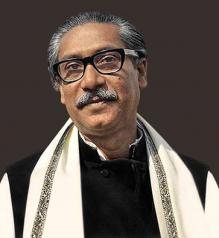By Md Morshadur Rahman
DHAKA, August 9, 2017, 2017 (BSS)-Father of the Nation Bangabandhu Sheikh Mujibur Rahman set a historic example of strengthening the cyclone preparedness programme (CPP) and attaching highest priority to building a disaster resilient nation.
“Soon after the birth of Bangladesh, Bangabandhu established the relief ministry giving a special attention to building a disaster resilient country through minimizing losses of lives and properties caused by different natural events including cyclone and flood,” director general of Department of Disaster Management Md Reaz Ahmed told BSS today.
“The size of the national budget for the fiscal year of 1973-74 was Taka 995 crore. Of the fund, Taka 200 crore was allocated for rehabilitation of flood affected people in 1974 under the directives of Bangabandhu,” he added. This historic and courageous decision of Bangabandhu simply reflects how much priority the great leader had given to the field of disaster management at that time, Reaz added. Official records showed it was indeed a courageous initiative of Bangabandhu to formulate the CPP in the perspective of war-ravaged Bangladesh. In the wake of financial crisis in continuing activities of the CPP, Bangabandhu provided state patronizations to overcome financial hurdles.
The Ministry of Relief and Disaster Management sources said the November 12, 1970 devastating cyclone killed 3.5 lakh people along with colossal property damage. The less than one hour cyclone rendered millions of people homeless. The global community was deeply shaken seeing sufferings of the Bangalee nation in the devastating cyclone.
Bangabandhu Sheikh Mujibur Rahman, who was tremendously shocked at the loss of lives and properties, played a major role in forcing the then ruler of East Pakistan to shift election schedule of general election of 1970, which was held on December 17 of the same year, the sources said.
Reaz said after achieving the independence of Bangladesh, Bangabandhu Sheikh Mujibur Rahman, as part of his sincere efforts to rebuild a war- ravaged nation, felt it necessary to take up measures to build a buffer against natural disaster particularly tropical cyclones.
Some 250 cyclones with different magnitudes during the post and previous era of Bangladesh hit the country’s coastal parts, of which, 15 to 20 cyclones were extremely devastating. The disasters claimed the lives of people in their thousands, apart from damaging millions of houses and crops on several lakh hectares of land. Over one lakh people were killed in three cyclones that hit the then East Pakistan in 1962, 1963 and 1965.
In the wake of these three cyclones, the 1966 General Assembly of United Nations took a resolution that instructed League of Red Cross and Red Crescent Societies (LORCS) to provide assistances to the cyclone-hit victims.
Bangabandhu’s heart was broken to see the destruction and cruel power of the cyclone in 1970 and he never forgot its devastating impact that tore through the coastal regions. As a result, with assistance from League of Red Cross and Red Crescent Societies (LORCS) and Bangladesh Red Cross, Bangabandhu started the process to formulate the CPP.
With the inception of CPP, a study was carried out to prepare organizational structures to make it an effective and sustainable programme. The study result ensured the importance of building a community-based disaster management system in which young people will be the driving force, the official records showed.
The commitment of Bangabandhu to provide financial assistance for the CPP inspired its 20,430 volunteers to extend their humanitarian supports.
With the assistance of the United Nations, Bangabandhu had installed earthen forts locally known as “Mujib Kella” in coastal regions aiming to provide shelter to the affected people along with their cattle and domestics birds.
Bangabandhu’s milestone initiative helped Bangladesh to attain international recognition of the role model status in the field of disaster management.



